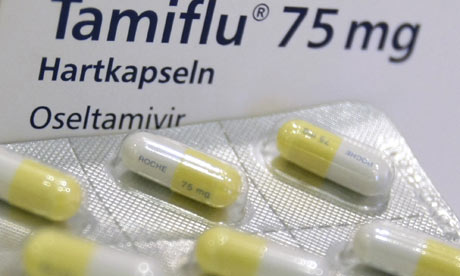
More than 150 people have been diagnosed with swine flu over the past 24 hours as the rate of infection accelerates, pushing the total number of UK cases above 1,000.
The latest figures are the largest recorded daily increase, adding to pressure on the Department of Health to abandon its strategy of containment.
The Scottish government has already switched tactics, using a more targeted deployment of anti-viral drugs to treat only close contacts and those deemed most at risk.
The largest number of newly diagnosed infections – 83 – are in Scotland; the centre of the outbreak there is Glasgow. The new cases led to the closure of five further schools and nurseries in Glasgow and Paisley, taking the total number of school and nursery closures in western Scotland to at least 25. Scottish health officials have also revealed that about a third of all cases have been found in 15- 24-year-olds, with few people over 65 contracting the virus. It is thought the elderly may have better resistance because their immune systems recognise the virus from past infections.
In England 72 new cases were reported, mainly among children in the West Midlands. The figures were released after the health secretary told the Commons that the health department policy of containing swine flu outbreaks will have to be dropped soon in favour of a more targeted use of anti-viral drugs. Andy Burnham said the government had accepted from the outset it was unlikely to be able to "prevent a widespread outbreak indefinitely".
He warned MPs that "at some point, we will need to move our focus away from limiting the spread of a localised virus, towards mitigating the effects of a widespread virus".
Burnham is due to meet the civil contingencies committee next week to decide at what stage the containment strategy will be dropped in favour of using anti-viral treatments in a more selective manner.
The committee will consider how anti-virals should best be deployed once the containment stage has been passed. Doctors are concerned that the swine flu virus could develop resistance to the drug Tamiflu.
In the meantime local health authorities are to be given greater flexibility in their responses to each outbreak. The Department of Health explained that there will be "continued anti-viral treatment of all those who have the virus but more targeted use of anti-viral prophylaxis [disease prevention], based on local risk assessment and limited to contacts considered most at risk of contracting the virus".
It added: "In practice, that will be mainly household or household-like contacts or, in a school context, those at surrounding desks; and the restriction of contact follow-up to those most at risk."
Among emergency precautions being considered to prevent larger outbreaks are the mass closure of schools across local districts in the autumn. Medical planners believe schools are one of the main transmission points. Peak rates of infections are expected either once term restarts or in a cold December.
The Conservative health spokesman, Andrew Lansley, questioned what the response should be for schools. "If the virus continues to be relatively modest in its severity, there will be an argument that school closures may be an excessive response," he told the Commons.
"But there is also an argument that if there are a very large number of cases and schools look like they are places where the virus is spread very rapidly, there will be a risk that if we did not close schools for a short period of time where cases are confirmed that we would overwhelm local health service facilities."
There is concern that public health messages about the severity of the virus have become confused. The World Health Organisation, which yesterday raised the alert to that of a global pandemic, described the virus as "moderate". The Department of Health has been describing it as "mild", although its latest warnings have said that it is "generally mild in most people, but ... severe in a small minority of cases".
So far 28 people have been treated in hospital, and the majority have made a full recovery. Burnham insisted that the UK was in a "very strong position to respond to the global pandemic we now face".
The UK has enough anti-viral Tamiflu tablets to protect half of the population, but orders are in place for 50 million doses – enough to cover 80%. Pharmaceutical companies are developing a swine flu vaccine.
"We are already speaking with manufacturers to agree what this means for our own plans for full country coverage of pandemic-specific vaccine, should this be required," Burnham told MPs.
"We have advance purchase agreements which enable the UK to purchase up to 132 million doses of pandemic-specific vaccine – enough for two doses for 100% of the population, should this be necessary. On current projections we expect the first deliveries of the pandemic vaccine to arrive in the autumn."

